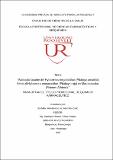Efecto antibacteriano del extracto hidroalcohólico del Rizoma de Zingiber officinale (jengibre) frente a cepas de Escherichia coli.

Fecha
2023-11-18Autor
Aquino Tullume, Emperatriz Raquel
Pacherres Reusche, Diana Carolina
Metadatos
Mostrar el registro completo del ítemResumen
El objetivo de la investigación es demostrar el efecto antibacteriano del extracto hidroalcohólico del rizoma de Zingiber officinale (Jengibre) frente a cepas de Escherichia coli. Utilizando un diseño experimental con dos grupos control y dos variables, se extrajo el rizoma de Zingiber officinale. La extracción se realizó mediante técnicas hidroalcohólicas y el método de difusión en pozo de Kirby Bauer modificado. Los resultados revelaron halos de inhibición significativos para el extracto de Zingiber officinale: 10,80 mm al 50%, 14,06 mm al 75%, y 15,46 mm al 100%. En conclusión, se demostró el efecto antibacteriano del extracto hidroalcohólico del rizoma de Zingiber officinale frente a Escherichia coli, evidenciado por halos de inhibición superiores al control negativo. The objective of the research is to demonstrate the antibacterial effect of the hydroalcoholic extract of Zingiber officinale (Ginger) rhizome against Escherichia coli strains. Using an experimental design with two control groups and two variables, the rhizome of Zingiber officinale was extracted. Extraction was performed using hydroalcoholic techniques and the modified Kirby Bauer well diffusion method. The results revealed significant inhibition halos for the Zingiber officinale extract: 10.80 mm at 50%, 14.06 mm at 75%, and 15.46 mm at 100%. In conclusion, the antibacterial effect of the hydroalcoholic extract of Zingiber officinale rhizome against Escherichia coli was demonstrated, evidenced by inhibition halos superior to the negative control.







